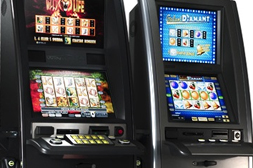 The state-owned gambling company Svenska Spel will add responsible gambling features to their “Vegas” brand of EGMs (Electronic Gaming Machines). There seems not yet to be any publicly available description of the new features, so what follows here are notes that I made during the event in Stockholm last week when the new machines were presented.
The state-owned gambling company Svenska Spel will add responsible gambling features to their “Vegas” brand of EGMs (Electronic Gaming Machines). There seems not yet to be any publicly available description of the new features, so what follows here are notes that I made during the event in Stockholm last week when the new machines were presented.
The EGMs will have a number of responsible gambling functions, if a player card is used. These functions include the possibility to set limits for money spent and time played (pre-commitment), self-exclusion for various periods of time, information about money spent, and a self-test for at risk- and problem gambling.
However, the player card is not mandatory. Using the card, the player gets access to all games available at the machine. Without the card it will still be possible to play the machine, but only some of the basic games. Thus, a player using the card and hitting precomitted gambling limits may simply remove the card and continue to play at a limited selection of games. Moreover, there will be no upper predetermined “hard” limits. The player sets his or her own limits and apparently these can be very high.
Naturally, these measures raises a number of questions regarding their effectiveness in limiting excessive EGM gambling. It will be very interesting to see how this turns out. At the seminar, Svenska Spel promised to closely monitor the effects of the new EGMs on player behavior and make data available for researchers. The company also said that if the preventive effects were not satisfactory, it could easily adjust and complement the responsible gambling features of the EGMs.
The Canadian researcher Robert Ladouceur held a presentation at the seminar, summing up the research on pre-commitment. Perhaps a bit disappointing for the Svenska Spel, there were little evidence to support the model they have chosen for their EGMs. Ladouceur argued that there is not much scientific evidence about the effectiveness of pre-commitment. Ladouceur based his presentation on the following publication:
- Ladouceur, R., A. Blaszczynski & D.R. Lalande. 2012. Pre-commitment in gambling: A review of the empirical evidence. International Gambling Studies, 12(2): 215-230.
Ladouceur mentioned that, according to prevalence data, the ban on EGMs in Norway a few years ago apparently did not reduce problem gambling. However, these data have been re-examined in a follow-up study, which noted that the two prevalence studies in question had very low response rates and that the confidence intervals for problem gambling prevalence overlapped; thus they give no clear indication of the effect of the EGM ban. Summing up information from various sources and new investigations, the follow-up study concludes:
“The follow-up study showed that … [t]he ban on slot machines had a positive effect on around half of their frequent users.” Read the report here (including an English summary).
It is also well known that the EGM ban in Norway caused a dramatic reduction in the number of calls to the national helpline from EGM problem gamblers and that the reduction has been stable – from about 1250 calls a year in 2005 to 25 (twentyfive) in 2011. The total number of calls from problem gamblers has in the same time period decreased from 2100 calls to 746.
In Norway, a new type of EGMs was introduced when the ban on slots was lifted in 2009. These EGMs have relatively strict responsible gambling features – for example “hard” predetermined spending limits and a 10 minute mandatory break after one hour of play. Initial data suggest that the responsible gambling features are quite effective in preventing excessive EGM gambling. See this presentation and this presentation.
As said, it will be very interesting to see what effects on problem gambling that the new Swedish EGMs will have. The rollout is planned for this spring.

